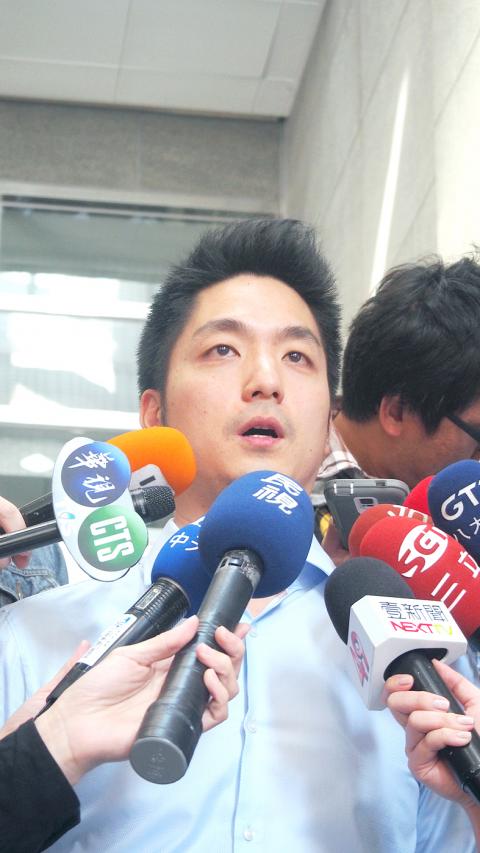Chiang Wan-an (蔣萬安), the son of former Chinese Nationalist Party (KMT) vice chairman John Chiang (蔣孝嚴) and a fourth-generation descendant of former president Chiang Kai-shek (蔣介石), on Sunday announced that he would run in the KMT’s legislative primary in Taipei’s Zhongshan (中山) and Songshan (松山) districts, pitting himself against incumbent KMT Legislator Lo Shu-lei (羅淑蕾) and KMT Taipei City Councilor Wang Hung-wei (王鴻薇).
Chiang Wan-an’s bid for the candidacy has been described by pundits as an attempt to avenge his father’s defeat at the hands of Lo in a 2011 KMT legislative primary.
Chiang Wan-an, 37, rejected the accusation, saying that there was no animosity between his family and Lo.

Photo: Tsai Ya-hua, Taipei Times
The nation has changed since the Sunflower movement and the nine-in-one elections last year, and young people need to step forward and bolster the KMT after the party suffered its greatest defeat in last year’s elections, Chiang Wan-an said.
Chiang Wan-an, who holds a law degree from the University of Pennsylvania, has been working as a lawyer in the US and is a partner in a Taiwanese law firm. He said that he does not have dual citizenship when reporters asked him about his nationality.
Meanwhile, the KMT’s Taipei branch said competition for the party’s legislative candidacy in Neihu (內湖) and Nangang (南港) districts is heated, with eight aspirants joining the primary after incumbent KMT Legislator Alex Tsai (蔡正元) announced that he would not seek re-election.
Among the eight aspirants are former KMT legislator Chiu Yi (邱毅) and former Mainland Affairs Council deputy minister Chang Hsien-yao (張顯耀).
The party’s regulations state that where there is only one registered candidate in a constituency, the candidate would be automatically nominated for the next year’s legislative elections, but if more than two contenders vie with an incumbent lawmaker for the party’s nomination, the incumbent has to pass an assessment, win a poll by a 5 percent margin and be approved by a nomination panel to secure the candidacy.
The nomination mechanism has been criticized by KMT Taipei City Councilor Lee Ching-yuan (李慶元) as lacking transparency, saying that the party is biased toward incumbents, and that it has not yet expounded on the methodology used in the assessment and poll.
“Should not incumbent legislators be held accountable [for the KMT’s rout in last year’s nine-in-one elections]? Will the public be satisfied when it sees the same old faces running the legislature again?” Lee said.
Lee said he declined to sign up for the primary as a protest against the party’s policy.
The list of members wishing to take part in the primaries was submitted to KMT headquarters yesterday, the Taipei branch said.

Chinese Nationalist Party (KMT) Chairman Eric Chu (朱立倫), spokeswoman Yang Chih-yu (楊智伃) and Legislator Hsieh Lung-chieh (謝龍介) would be summoned by police for questioning for leading an illegal assembly on Thursday evening last week, Minister of the Interior Liu Shyh-fang (劉世芳) said today. The three KMT officials led an assembly outside the Taipei City Prosecutors’ Office, a restricted area where public assembly is not allowed, protesting the questioning of several KMT staff and searches of KMT headquarters and offices in a recall petition forgery case. Chu, Yang and Hsieh are all suspected of contravening the Assembly and Parade Act (集會遊行法) by holding

PRAISE: Japanese visitor Takashi Kubota said the Taiwanese temple architecture images showcased in the AI Art Gallery were the most impressive displays he saw Taiwan does not have an official pavilion at the World Expo in Osaka, Japan, because of its diplomatic predicament, but the government-backed Tech World pavilion is drawing interest with its unique recreations of works by Taiwanese artists. The pavilion features an artificial intelligence (AI)-based art gallery showcasing works of famous Taiwanese artists from the Japanese colonial period using innovative technologies. Among its main simulated displays are Eastern gouache paintings by Chen Chin (陳進), Lin Yu-shan (林玉山) and Kuo Hsueh-hu (郭雪湖), who were the three young Taiwanese painters selected for the East Asian Painting exhibition in 1927. Gouache is a water-based

Taiwan would welcome the return of Honduras as a diplomatic ally if its next president decides to make such a move, Minister of Foreign Affairs Lin Chia-lung (林佳龍) said yesterday. “Of course, we would welcome Honduras if they want to restore diplomatic ties with Taiwan after their elections,” Lin said at a meeting of the legislature’s Foreign Affairs and National Defense Committee, when asked to comment on statements made by two of the three Honduran presidential candidates during the presidential campaign in the Central American country. Taiwan is paying close attention to the region as a whole in the wake of a

OFF-TARGET: More than 30,000 participants were expected to take part in the Games next month, but only 6,550 foreign and 19,400 Taiwanese athletes have registered Taipei city councilors yesterday blasted the organizers of next month’s World Masters Games over sudden timetable and venue changes, which they said have caused thousands of participants to back out of the international sporting event, among other organizational issues. They also cited visa delays and political interference by China as reasons many foreign athletes are requesting refunds for the event, to be held from May 17 to 30. Jointly organized by the Taipei and New Taipei City governments, the games have been rocked by numerous controversies since preparations began in 2020. Taipei City Councilor Lin Yen-feng (林延鳳) said yesterday that new measures by